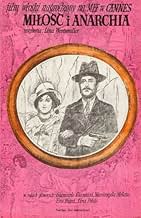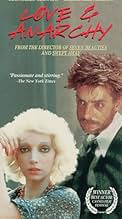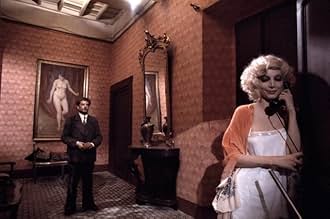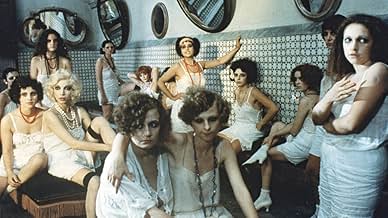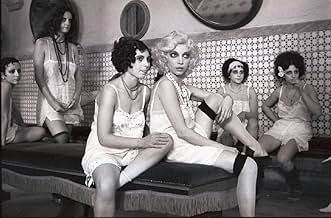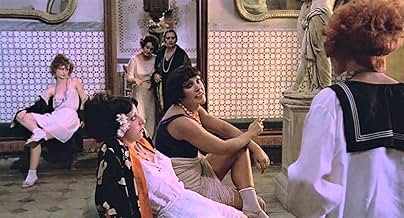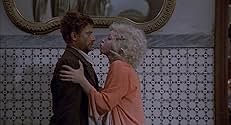Film d'amore e d'anarchia, ovvero 'stamattina alle 10 in via dei Fiori nella nota casa di tolleranza...'
VALUTAZIONE IMDb
7,7/10
3732
LA TUA VALUTAZIONE
Quando un amico viene assassinato dai fascisti, un malinconico contadino si stabilisce in un bordello romano mentre lui e una prostituta anarchica complottano per assassinare Mussolini.Quando un amico viene assassinato dai fascisti, un malinconico contadino si stabilisce in un bordello romano mentre lui e una prostituta anarchica complottano per assassinare Mussolini.Quando un amico viene assassinato dai fascisti, un malinconico contadino si stabilisce in un bordello romano mentre lui e una prostituta anarchica complottano per assassinare Mussolini.
- Premi
- 4 vittorie e 3 candidature totali
Recensioni in evidenza
To live like a dog or to die like a dog? It is an elemental question hovering above the head of a disaffected but weak-minded farmer Tunin (Giannini), after his anarchist friend being murdered by fascist police, he decisively joins the anarchist camp, and takes up his dead friend's cause, to kill Benito Mussolini. He arrives in Rome, and contacts his comrade Salomè (Melato), a premier prostitute in a brothel, who will assist to carry out his assassin plan. During a location scout with the unsuspecting Spatoletti (Pagni), the head of Mussolini's police division, Tunin falls for a young working girl Tripolina (Polito), will the mutually spontaneous romance spoil Tunin's determination of his action? Or, does it matter?
LOVE AND ANARCHY is Wertmüller's seventh feature, which debuted in Cannes in competition and won Giannini BEST ACTOR award. It is the second teamwork for Wertmüller, Giannini and Mariangela Melato, after THE SEDUCTION OF MIMI (1972), and they would try a third time in SWEPT AWAY (1974) one year later.
Freckle-faced, disheveled, Tunin is an honest but slow-witted countryside man, hasn't been to seaside before, he is not even a radical anarchist, but avenging the death of his friend, is the only thing he knows that can prove his worth, whether or not it is a suicidal mission. Fear is something he has to battle everyday, Giannini registers a viscerally soul-pulverising performance as Tunin, downplays his masculine charm and portrays him as a sympathetic, the salt of the earth sort, a cog in the machine, but radiates with those attributes what make human human. Mariangela Melato's Salomé, a spitfire driven by her own scores against the repressing government, is also superbly thrilling to behold, her piercing look, gravelly voice, worldly-wise flamboyance, and her unabashed camaraderie and affection towards Tunin, leaves a searing impact afterwards. A then 19-year-old Polito, a debutante in her full-fledged flapper outfit, thrusts herself into a more rational attempt to save her lover, only to no avail.
Wertmüller's resplendent depiction of the Italian brothel is certainly inspired by aesthetics of Fellini school, and her taste for music is admirably impeccable as well, whether it is classical pieces like Debussy's CLAIRE DE LUNE, or the catchy French ditty LA PETITE TONKINOISE by Vincent Scotto, together with Nino Rota's sentimentally melodious score, emotionality and vivacity are eternally among the national spirits running in the Mediterranean blood of Italian people, not even the ominous subject matter and demoralising situation can change its tonality.
Less heralded than Wermüller and Giannini's most acclaimed collaboration SEVEN BEAUTIES (1975), which earned both Oscar nominations (yes, Wermüller is the first woman who has even been nominated for BEST DIRECTOR), LOVE AND ANARCHY is no less a fine-crafted equivalent which speaks loud about its filmmakers' political slant and an outstanding melodrama can transfix its audience without compromising its thematic tragic.
LOVE AND ANARCHY is Wertmüller's seventh feature, which debuted in Cannes in competition and won Giannini BEST ACTOR award. It is the second teamwork for Wertmüller, Giannini and Mariangela Melato, after THE SEDUCTION OF MIMI (1972), and they would try a third time in SWEPT AWAY (1974) one year later.
Freckle-faced, disheveled, Tunin is an honest but slow-witted countryside man, hasn't been to seaside before, he is not even a radical anarchist, but avenging the death of his friend, is the only thing he knows that can prove his worth, whether or not it is a suicidal mission. Fear is something he has to battle everyday, Giannini registers a viscerally soul-pulverising performance as Tunin, downplays his masculine charm and portrays him as a sympathetic, the salt of the earth sort, a cog in the machine, but radiates with those attributes what make human human. Mariangela Melato's Salomé, a spitfire driven by her own scores against the repressing government, is also superbly thrilling to behold, her piercing look, gravelly voice, worldly-wise flamboyance, and her unabashed camaraderie and affection towards Tunin, leaves a searing impact afterwards. A then 19-year-old Polito, a debutante in her full-fledged flapper outfit, thrusts herself into a more rational attempt to save her lover, only to no avail.
Wertmüller's resplendent depiction of the Italian brothel is certainly inspired by aesthetics of Fellini school, and her taste for music is admirably impeccable as well, whether it is classical pieces like Debussy's CLAIRE DE LUNE, or the catchy French ditty LA PETITE TONKINOISE by Vincent Scotto, together with Nino Rota's sentimentally melodious score, emotionality and vivacity are eternally among the national spirits running in the Mediterranean blood of Italian people, not even the ominous subject matter and demoralising situation can change its tonality.
Less heralded than Wermüller and Giannini's most acclaimed collaboration SEVEN BEAUTIES (1975), which earned both Oscar nominations (yes, Wermüller is the first woman who has even been nominated for BEST DIRECTOR), LOVE AND ANARCHY is no less a fine-crafted equivalent which speaks loud about its filmmakers' political slant and an outstanding melodrama can transfix its audience without compromising its thematic tragic.
I saw this movie in the 1980s but it remains an all time favourite. It is a terrific story with a range of characters who demonstrate extremes of character. The women are sexy and smart and they are critical to the story. The music by Nino Rota is wonderful and delicately placed within the story. There are many memorable scenes. The stars Giancarlo Giannini, Mariangela Melato, and Lina Polito are perfect for their roles and there are many other notables including Eros Pagni who is the brute given charge of the black shirts. I've watched this film at least a dozen times and I plan to watch it many more before I return to the earth. I commend Love and Anarchy to you.
Giannini at his best , a cult wertmuller movie that has been forgotten but it's a very good movie not only for Italian public but also for cinema lovers of all genres. it's the story of a poor man , Tunin which he must kill Mussolini during a ceremony. So he stayed for a couple of days in a house where there are women that offer sexual lends by paying. Tunin will fall in love with two of them and that will be negative for his mission. The excellent acting and the lina wertmuller's directing made this film a masterpiece and a realistic portrait of Italy of the '30. Giancarlo Giannini and Mariangela Melato are really wonderful and they show that Italian acting is at American level
I saw this film two times in 1973 and a few years later again in art cinemas in the United States. I vividly remember the opening line, "I'm off to kill Mussolini. Screw the rest." While Fox Lorber put this film on DVD in 1997, it is now unavailable and sells for $37 used. I bought a made-in-China copy for $5 on Ebay. I was a bit upset when the first title read only "I'm off to kill Mussolini." I wondered why the change? Anyways the rest of the DVD seemed fine.
This is an amazing film. The acting by everyone is superb, with Giancarlo Gianini giving a performance that won him a best acting award at the Cannes film festival and should have won him an Oscar. He is Chaplinesque, but not imitative of Chaplin or anybody else. It is one of the most sympathetic performances ever given. In many scenes, he doesn't talk, but you sense his feelings of anger or sadness. His mass of freckles on his face make him look more like a 14 year old than a man planning a major political assassination. Mariangela Melato is sexy, foul-mouthed and hilarious. She also manages to make you believe that she is both a cynical prostitute and a politically and culturally aware anarchist. Lina Polito is the young prostitute with hope. She gives a performance similar to and as wonderful as Liza Minnelli in "Cabaret."
The musical score by Federico Fellini's main composer, Nino Rota, is energetic and terrific. It often counterpoints the action on the screen, bringing us away from it, and making some harsh scenes seem comical, but it also heightens the playfulness or menace in other crucial scenes. He won an Oscar for the Godfather Part II a few years later, but he deserved one here too.
This is a tribute to the European nihilist and anarchist movements of the 1800 and 1900's. It is also powerfully anti-fascist.
This is great and enthralling film-making. It is Lina Wertmuller's best film and still stands out today, nearly 40 years later, as a great historical and humanist work of art. It is sad that more people do not know about it and have not had the opportunity to experience it.
Having seen about 6,000 films (150 films X 40 years), I would put this one in the top twenty.
This is an amazing film. The acting by everyone is superb, with Giancarlo Gianini giving a performance that won him a best acting award at the Cannes film festival and should have won him an Oscar. He is Chaplinesque, but not imitative of Chaplin or anybody else. It is one of the most sympathetic performances ever given. In many scenes, he doesn't talk, but you sense his feelings of anger or sadness. His mass of freckles on his face make him look more like a 14 year old than a man planning a major political assassination. Mariangela Melato is sexy, foul-mouthed and hilarious. She also manages to make you believe that she is both a cynical prostitute and a politically and culturally aware anarchist. Lina Polito is the young prostitute with hope. She gives a performance similar to and as wonderful as Liza Minnelli in "Cabaret."
The musical score by Federico Fellini's main composer, Nino Rota, is energetic and terrific. It often counterpoints the action on the screen, bringing us away from it, and making some harsh scenes seem comical, but it also heightens the playfulness or menace in other crucial scenes. He won an Oscar for the Godfather Part II a few years later, but he deserved one here too.
This is a tribute to the European nihilist and anarchist movements of the 1800 and 1900's. It is also powerfully anti-fascist.
This is great and enthralling film-making. It is Lina Wertmuller's best film and still stands out today, nearly 40 years later, as a great historical and humanist work of art. It is sad that more people do not know about it and have not had the opportunity to experience it.
Having seen about 6,000 films (150 films X 40 years), I would put this one in the top twenty.
Rather than contend for film with the longest title, "Film of Love and Anarchy (or At Ten o'clock This Morning in Via dei Fiori in the Infamous House of Prostitution)" is better known by the more manageable "Love and Anarchy". This 1973 Lina Wertmüller thriller is a hard first watch because there is no suspense to grab the viewer and hook them into the story. I was only able to handle about 30 minutes at a time, not because it was unpleasant but because I was too uninvolved in the story to ignore distractions and interruptions. But while it withholds most of its appeal from the initial viewing, it yields something new each time it is viewed.
"Love and Anarchy" is more an expressionistic opera than a realistic thriller. Imagine "Cabaret" starring Charlie Chaplin's "Little Tramp" and you will have a good idea of its style.
It's main theme sneaks up and surprises you. U.S. viewers, dimly aware of the great depression and World War Two, suffer a complete cultural disconnect regarding the continuing legacy of fascism in Italy and Germany. Meaning that anti-fascist political messages are embedded in almost all post-war Italian cinema. But Wertmüller's "Love and Anarchy" has the broader theme of anti-extremism, taking shots at those who make major sacrifices out of perverted idealism and a lack historical perspective.
The film begins with its main character Tonino (Giancarlo Giannini) at a turning point in his life, the execution of an older relative for political subversion. After viewing the body on display in what would otherwise by an idyllic rural setting, Torino is inspired to take over what he perceives as his relative's mission, the assassination of Benito Mussolini.
Tonino goes to Rome and links up with his anarchist contact, a highly sought after call girl named Salomè (another Wertmuller regular Mariangela Melato), her brothel is popular with the Fascists and Mussolini's head of security, an arrogant blow-hard named Spatoletti (Eros Pagni), is especially fond of Salomè.
Tonino and young call girl Tripolina (Lina Polito) soon fall in love which serves to greatly complicate his mission.
I watched the widescreen version of the film on the Fox Lorber DVD, and contrary to several other comments I found no problems with the film transfer. My guess is that these refer to the variation in color tone as the film cuts between characters, but this is a deliberate effect by Wertmüller's. She lights each face differently to convey the character's motivation. The uncomplicated Torino is given natural lighting, the political Salomè is tinted red, and the disillusioned Tripolina is in shadow. These combine with bold colors, a surreal score, and acute camera angles that exaggerate elements and play with scale in many of the frames. The everyday scenes in the brothel are especially good, combining the audacious with the darkly comic. The best is a carnival-like montage to music showcasing the start of a busy day of business for the prostitutes and their eager customers.
In almost any other film Pagni would steal the whole thing with his overplayed performance but Melato matches him line for line. This contrasts nicely with the more subtle and nuanced performances of Giannini and Polito. Polito is very effective when Wertmüller makes use of her eyes in several close-ups.
There is much overwrought melodrama as Wertmüller uses a farcical tone to illustrate that the Fascists and their opposition are linked by a common hypocrisy and a shared perversion of idealism. Ironically the film is at its best during its quiet scenes such as Tornio and Tripolina's stroll through the plazas of the city.
This is an important film with an original message, fine performances from the entire ensemble, and really slick film-making techniques.
Then again, what do I know? I'm only a child.
"Love and Anarchy" is more an expressionistic opera than a realistic thriller. Imagine "Cabaret" starring Charlie Chaplin's "Little Tramp" and you will have a good idea of its style.
It's main theme sneaks up and surprises you. U.S. viewers, dimly aware of the great depression and World War Two, suffer a complete cultural disconnect regarding the continuing legacy of fascism in Italy and Germany. Meaning that anti-fascist political messages are embedded in almost all post-war Italian cinema. But Wertmüller's "Love and Anarchy" has the broader theme of anti-extremism, taking shots at those who make major sacrifices out of perverted idealism and a lack historical perspective.
The film begins with its main character Tonino (Giancarlo Giannini) at a turning point in his life, the execution of an older relative for political subversion. After viewing the body on display in what would otherwise by an idyllic rural setting, Torino is inspired to take over what he perceives as his relative's mission, the assassination of Benito Mussolini.
Tonino goes to Rome and links up with his anarchist contact, a highly sought after call girl named Salomè (another Wertmuller regular Mariangela Melato), her brothel is popular with the Fascists and Mussolini's head of security, an arrogant blow-hard named Spatoletti (Eros Pagni), is especially fond of Salomè.
Tonino and young call girl Tripolina (Lina Polito) soon fall in love which serves to greatly complicate his mission.
I watched the widescreen version of the film on the Fox Lorber DVD, and contrary to several other comments I found no problems with the film transfer. My guess is that these refer to the variation in color tone as the film cuts between characters, but this is a deliberate effect by Wertmüller's. She lights each face differently to convey the character's motivation. The uncomplicated Torino is given natural lighting, the political Salomè is tinted red, and the disillusioned Tripolina is in shadow. These combine with bold colors, a surreal score, and acute camera angles that exaggerate elements and play with scale in many of the frames. The everyday scenes in the brothel are especially good, combining the audacious with the darkly comic. The best is a carnival-like montage to music showcasing the start of a busy day of business for the prostitutes and their eager customers.
In almost any other film Pagni would steal the whole thing with his overplayed performance but Melato matches him line for line. This contrasts nicely with the more subtle and nuanced performances of Giannini and Polito. Polito is very effective when Wertmüller makes use of her eyes in several close-ups.
There is much overwrought melodrama as Wertmüller uses a farcical tone to illustrate that the Fascists and their opposition are linked by a common hypocrisy and a shared perversion of idealism. Ironically the film is at its best during its quiet scenes such as Tornio and Tripolina's stroll through the plazas of the city.
This is an important film with an original message, fine performances from the entire ensemble, and really slick film-making techniques.
Then again, what do I know? I'm only a child.
Lo sapevi?
- QuizErrico Malatesta, who is quoted at the end of the film, was an Italian anarchist propagandist and revolutionary socialist. He edited several radical newspapers and spent much of his life exiled and imprisoned, having been jailed and expelled from Italy, England, France, and Switzerland. After World War I, he returned to Italy where his Umanità Nova, an anarchist newspaper, had some popularity before its closure under the rise of Mussolini. Malatesta was a committed revolutionary. He believed that the anarchist revolution was inevitable and that violence would be a necessary part of it since the state rested ultimately on violent coercion.
- Curiosità sui creditiBefore end credits: "I wish to repeat my horror that attacks, which besides being bad in and of themselves are also stupid, because they harm the very cause they are trying to serve...But those assassins are also saints and heroes...And they will be celebrated once the brutal facts are forgotten, and all that is remembered is the idea that inspired them and the martyrdom that made them saints.--Errico Malatesta."
- Versioni alternativeFor the initial American release, editor Fima Noveck created a prologue which featured a montage of photos of Mussolini, along with a crawl explaining his rise to power and the violent activities sanctioned in his name during his reign.
- ConnessioniFeatured in Dietro gli occhiali bianchi (2015)
I più visti
Accedi per valutare e creare un elenco di titoli salvati per ottenere consigli personalizzati
- How long is Love & Anarchy?Powered by Alexa
Dettagli
- Data di uscita
- Paesi di origine
- Lingua
- Celebre anche come
- Film d'amore e d'anarchia
- Luoghi delle riprese
- Parrocchia Santissima Annunziata, Piazza Reg. Margherita, 6, 04016 Sabaudia LT, Italia(Tunin cases the outside of the church)
- Aziende produttrici
- Vedi altri crediti dell’azienda su IMDbPro
Botteghino
- Lordo in tutto il mondo
- 965 USD
- Tempo di esecuzione2 ore 4 minuti
- Mix di suoni
- Proporzioni
- 1.85 : 1
Contribuisci a questa pagina
Suggerisci una modifica o aggiungi i contenuti mancanti

Divario superiore
By what name was Film d'amore e d'anarchia, ovvero 'stamattina alle 10 in via dei Fiori nella nota casa di tolleranza...' (1973) officially released in India in English?
Rispondi

